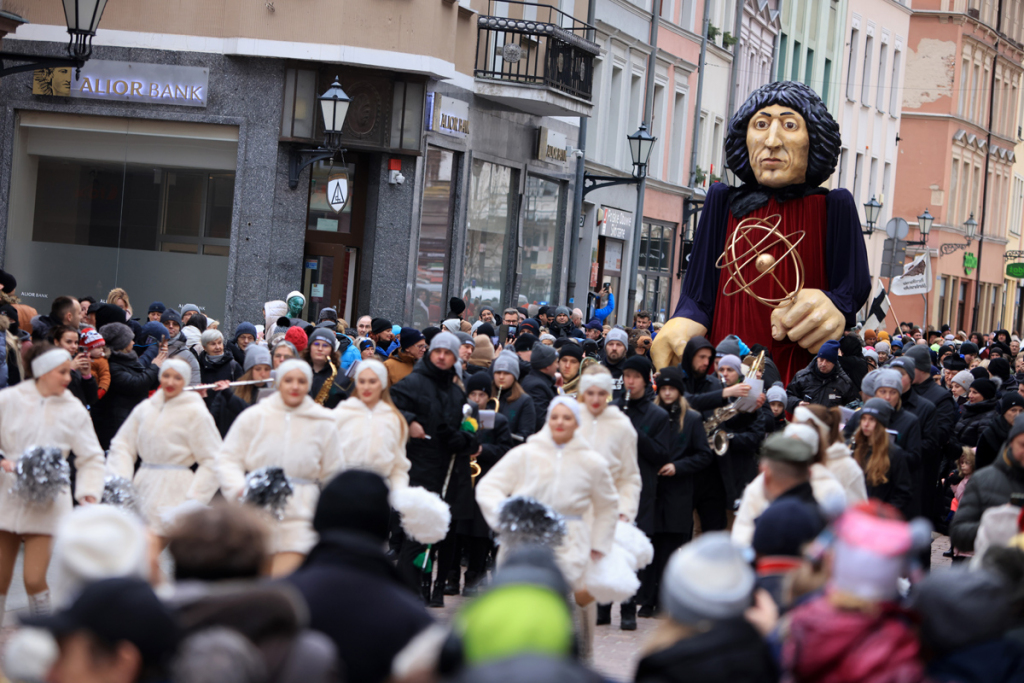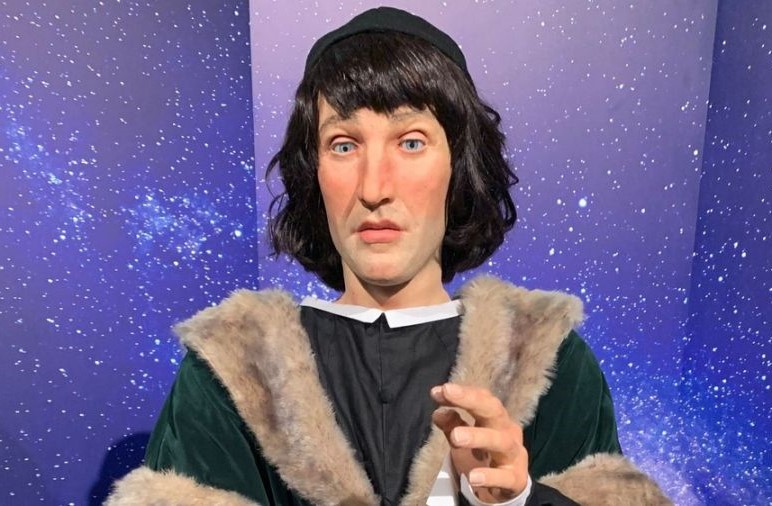A robot in the form of Polish-born astronomer Nicolaus Copernicus, which can hold conversations using artificial intelligence, has been unveiled in Warsaw as part of nationwide events to commemorate the 550th anniversary of the groundbreaking scientist’s birth.
The device has been installed at the Copernicus Science Centre (CNK), where it will interact with visitors. Among the first to speak with it was education minister Przemysław Czarnek, who asked the robot if Latin and philosophy should return to the core curriculum in Polish schools (as he has proposed).
“Yes, absolutely,” answered Robo-Copernicus, who wrote his major works in Latin, including his magnum opus, De revolutionibus orbium coelestium, in which he expounded the then-revolutionary idea that the Sun – rather than the Earth – is at the centre of the universe.
“Latin and philosophy are an important part of our historical heritage and intellectual development,” continued the robot. “I believe these subjects should be treated as fundamental in the education of young people, because it increases their analytical and creative abilities and opens the door to new academic opportunities.”
📺Czy łacina powinna wrócić do szkół? To jedno z pytań, które minister @CzarnekP zadał Mikołajowi Kopernikowi, najbardziej zaawansowanemu robotowi humanoidalnemu na świecie, wykorzystującemu model językowy #GPT3. Cała rozmowa już jutro! #Kopernik550 pic.twitter.com/jnKbZT3wVX
— Ministerstwo Edukacji i Nauki (@MEIN_GOV_PL) February 18, 2023
Speaking to news website Onet about the robot, CNK spokeswoman Katarzyna Nowicka said that visitors can “really talk to him like a normal person. You can ask him any questions”.
She admitted that sometimes he “gets stage fright” and “takes a bit longer to think, or says a word ungrammatically, but he says everything himself, no one is controlling him, there is nothing fake here, everything is real”.
“It’s a machine that can learn and, what is more, has a personality,” added CNK’s director, Robert Firmhofer, though he also assured visitors that the robot “will not revolt” against humans.
The launch of Robo-Copernicus comes at a time of heightened discussion worldwide of artificial intelligence amid the development of OpenAI’s ChatGPT and the use of its technology by Microsoft’s Bing search engine.
Nowicka noted that whereas ChatGPT “uses 20 billion protocols, our robot uses 175 billion”. The device – which is 190 cm (6’3″) tall and weighs 100 kg (220 lbs) – cost over one million zloty (€210,000) to create.
To mark the 550th anniversary of Copernicus’ birth, Poland’s parliament has declared 2023 to be the “The Year of Copernicus”. Towns and cities around the country are holding various events to mark the occasion.
Prominent among them is Toruń in central Poland, where Copernicus was born in 1473. The city – then known by its German name of Thorn – was part of Royal Prussia, a province that seven years earlier had become part of the Kingdom of Poland.
Copernicus grew up in a mainly German-speaking household, though later studied at the University of Kraków (now known as the Jagiellonian University) – Poland’s oldest university – and was, like his new robot incarnation, fluent in Polish.
Scientific American goes on the trail of Copernicus, the astronomer whose work put the Sun, rather than the Earth, at the centre of the universe, and who lived, worked and died in Poland https://t.co/CX9f6I7jR7
— Notes from Poland 🇵🇱 (@notesfrompoland) December 8, 2018
Other major events are taking place in Frombork, the town in northern Poland where Copernicus spent much of his life and conducted most of his astronomical observations. Today, a new exhibition dedicated to the astronomer was opened at the town’s Copernicus museum.
In Toruń, the World Copernican Congress was inaugurated at the city’s Nicolaus Copernicus University. In a letter to participants, Poland’s president, Andrzej Duda, recalled that Copernicus was not only a gifted astronomer but a polymath who also carried out important work in mathematics, economics and medicine.
Another Polish city where Copernicus lived, Olsztyn, has produced a special bread baked from a 16th-century recipe to mark the fact that the scientist was in 1531 involved in calculating fair prices for bread that contributed to a bread tax introduced in the region.

A parade in Toruń yesterday to mark the 550th anniversary of Copernicus’ birth (source: Sławomir Kowalski/Torun.pl)
Main image credit: Centrum Nauki Kopernik

Daniel Tilles is editor-in-chief of Notes from Poland. He has written on Polish affairs for a wide range of publications, including Foreign Policy, POLITICO Europe, EUobserver and Dziennik Gazeta Prawna.




















